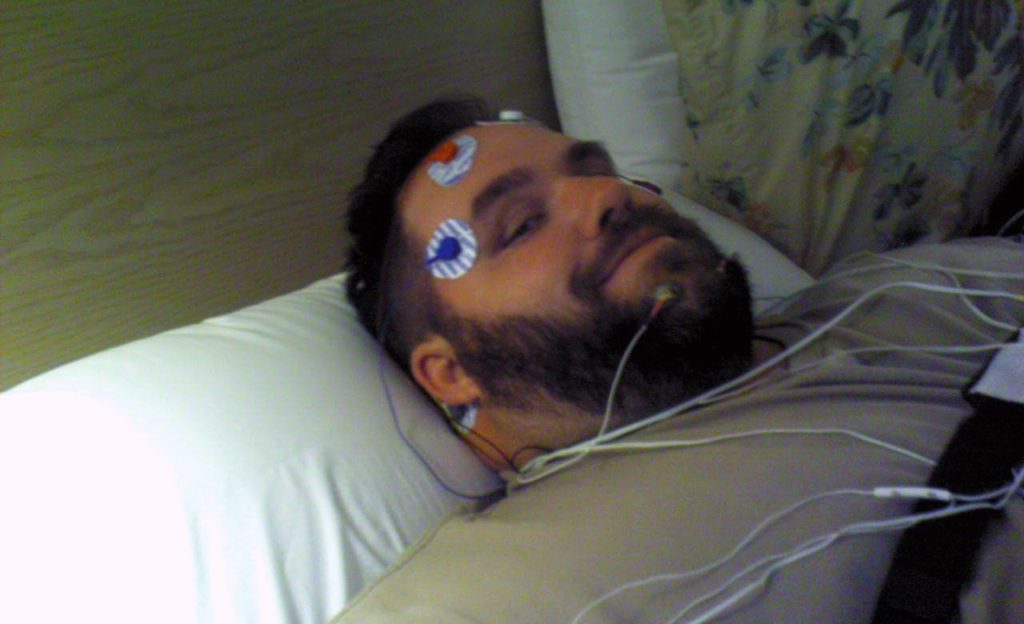Frequent awakenings at night (intermittent sleep)
Very often, patients suffering from frequent nocturnal awakenings turn to a somnologist, and in his absence, to a psychiatrist or neurologist. Usually, the state of awakening is associated with neurological, psychiatric or general somatic diseases. Also, this type of sleep pathology is a constant companion of citizens who abuse alcohol or drugs. All sorts of stresses and seasonal depressions play an important role in development.
By themselves, frequent nighttime awakenings are not a problem that causes serious harm to health. However, people, as a rule, take this too seriously, and instead of continuing to sleep peacefully, they begin to worry, think about how to fall asleep, look for the reason for the interruption of sleep, which leads to the loss of a sleepy state. However, the usual simple relaxation is the most correct behavior, as a result of which a person falls asleep and almost completely sleeps.
According to the classification of sleep disorders, interrupted sleep and early awakenings belong to the category of insomnia - falling asleep disorders. Frequent nocturnal awakenings are characteristic of emotional, anxious, impressionable natures.. They are based on the state of continuing processing by the brain of psycho-emotional information received during the day. It is because of this that sleep remains superficial for a long time and is easily interrupted.
Interrupted sleep in infants is even more common and occurs because toddlers' sleep phases change more frequently than adults. This condition is also not a problem, and only if the child becomes lethargic, constantly sleepy and begins to act up, you should contact a pediatrician or a neurologist.
If usually sleep is normal and suddenly frequent nighttime awakenings began to bother you, you need to look for external stimuli. Maybe it's a newly installed lantern outside the window, the heating is on and, as a result, it's too hot in the bedroom and the air is dry, maybe you bought a mattress that you can't get used to, or new smells have appeared in the house (from pets).

“I wake up at 3 am and then I can’t sleep” is another common complaint. Or wake up in the middle of the night. The fact is that at about three o'clock in the morning the temperature of the human body is the maximum for the entire time of sleep, which can also lead to awakening. Do not focus on this phenomenon. It is nervousness due to such a physiological feature that will prevent you from sleeping.
“I often wake up at night, and then I can’t sleep,” such complaints can often be heard from people of various ages, professions and social groups. The most common cause of sleep disorders is simply poor sleep hygiene.. Falling asleep when you have to, falling asleep in front of the TV, plentiful food right before bedtime, too warm bedroom - these are the simplest factors, by eliminating which, many can quickly restore the quality of sleep and sleep until morning, as they say, without hind legs. Some make the mistake of starting to fight insomnia with a bottle of beer before bed. Alcohol only excites the nervous system and leads to the opposite result.
The quality of a mattress should not be underestimated: the continuity of sleep and its depth also strongly depend on its properties. A certain role is played by the presence of a partner in the same bed. And although people subjectively believe that sleep together is deeper, calmer and of higher quality, however, according to objective studies (polysomnography), sleep together is inferior in quality to sleep alone, when a person is the only rightful owner of the entire bed.
There are many physiological causes that cause intermittent light sleep:
- older people often wake up in the middle of the night and take a nap during the day;
- women wake up due to hormonal changes occurring in them every month;
- pregnant women often wake up at night for various reasons: convulsions due to lack of minerals, frequent urge to urinate, fetal movements;
- at the onset of menopause, women can also often wake up due to sweating, fever, and other physiological manifestations of the condition.
Often there are sleep disturbances that occur due to changes in the sleep/wake cycle associated with working on a night or daily schedule, frequent air travel with changing time zones. In these cases, the work of the internal clock is simply disrupted in a person. This is a situational pathology associated with the functioning of biological rhythms.
It is impossible not to mention the role of the well-known sleep hormone, melatonin, in the formation of a good sleep. Melatonin is formed from serotonin, which in turn is formed every day in the human body when it is outdoors under the influence of sunlight for at least 30-40 minutes. Seratonin is converted to melatonin, a high concentration of which in the body by the end of the day contributes to deep sleep. Melatonin and seratonin do not accumulate in the body, so in order to sleep well, you need to get your portion of sunlight during the day.
Also, people can often wake up at night due to painful conditions: with arthrosis, osteochondrosis, diabetes, diseases of the thyroid gland, cardiovascular system. In all cases where you suspect that a disease is the cause of poor sleep, you need to contact a specialist and treat the underlying disease.
Waking at night with difficulty falling asleep
This kind of insomnia as frequent awakenings at night is a disease of modern civilization and occurs in almost a third of the entire population. The criterion for believing that you have chronic insomnia is the presence of complaints of poor sleep most days of the week for more than three months. In the case of chronic pathology, patients are disturbed during the day by fatigue, impaired attention and memory, irritability, headache, or problems with the gastrointestinal tract. Psychological problems also begin due to worries about sleep: before falling asleep, a person fears that he will not get enough sleep again and because of the experiences he can no longer fall asleep, which can provoke real insomnia.
There are also hereditary forms of the disease. People with these forms report intermittent sleep from childhood. Their parents are also diagnosed with the same condition. Usually this is a defect in hormone metabolism, which is normalized by medication.
Diagnostics

Sensors connected to a person during a polysomnography study
If you are concerned about frequent awakenings at night, see a sleep specialist. A sleep doctor analyzes the quality of sleep using a polysomnographic study. This method combines simultaneous registration of ECG, electroencephalography, electromyography, audio monitoring of snoring, analyzes limb movements, respiratory movements, reads body temperature, pulse, blood pressure and other indicators. The data obtained make it possible to assess the duration of sleep, the number of awakenings, the distribution of phases, respiratory disorders, heart rhythm, to identify abnormal movements and to diagnose the type and type of parasomnias.
Polysomnography is especially helpful when a person comes in and tells me that I seem to wake up every time. But in fact, research shows that a person sleeps very soundly and he simply dreams of this state. This state of imaginary waking up is also quite common.
How to overcome frequent nighttime awakenings
To restore normal sleep and not wake up often in a dream, you need to follow some simple rules before going to bed:
- Comfortable temperature in the bedroom should be no higher than 18-20 degrees.
- Silence and darkness are the best companions of normal falling asleep.
- You need to have dinner no later than two hours before bedtime, and fatty and spicy dishes should be excluded from the menu.
- Avoid alcohol and caffeine 3 hours before bed.
- No need to think about important things before going to bed.
- It is important to go to bed at the same time every day.
- You should not fill up during the day, even if there is a feeling of drowsiness - it is better to overcome it.
- Sleep should last no less and no more than 6-8 hours. Too much sleep is just as bad as too little sleep.
- An hour before bedtime, you should stop working at the computer and watching television.
- An hour before going to bed should be devoted to relaxation - take a relaxing warm bath, take care of yourself, listen to pleasant music.
- At night, you can drink a glass of herbal tea or milk with honey.
And only if, despite all the measures taken, sudden awakenings occur at least three times a week and last at least half an hour, within a month, you should consult a doctor for advice. In no case should you resort to medications on your own. You can meet people who take tonics in the morning to cheer up, and sleeping pills in the evening. Self-treatment gradually depletes the body's reserve forces, not only not restoring sleep, but also not giving even a temporary feeling of rest and contributing to the development of chronic psychosomatic diseases.
How often do you wake up at night?











